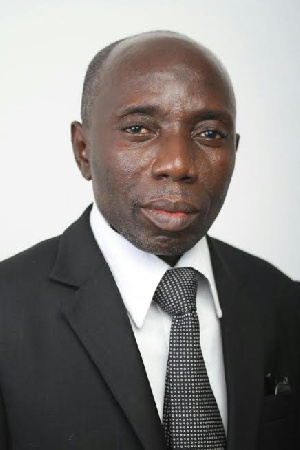 Ishmael Kwesi Otchere, Executive Director of Microfin Rural Bank
Ishmael Kwesi Otchere, Executive Director of Microfin Rural Bank
Executive Director of Microfin Rural Bank (MRB), Ishmael Kwesi Otchere, has described as appropriate and timely the move by the central bank to raise the minimum capital requirement for rural banks and microfinance firms as it will restore security and trust to the sector.
According to him, the recapitalization will strengthen banks to “survive the test of time” in an ever competitive environment as banks’ total assets value keeps shrinking.
He told the B&FT in an interview: “The new capital requirement is about equity injection, and this is something commendable from the Bank of Ghana because it’s about strengthening the banks.
“As it stands, the total value of banks’ assets is shrinking and there is the need for more equity. Obviously, looking at the market competition and the need for increased leverage of technology to suit customers’ demand, banks will definitely need to inject more capital to be able to stand the test of time.”
Mr. Otchere indicated that although the new requirement comes as a bitter pill to those rural banks and microfinance companies who do not have the financial muscle, it is a necessary need that will improve the delivery of services offered by the sector to its large clientele base.
The central bank, as part of efforts to strengthen and restore confidence in the microfinance sector has raised the minimum capital requirement from the current GHC500,000 to GHC1 million effective 2017.
The financial sector regulator is also working to pass the Deposit Protection Act (DPA), a legal instrument to protect the deposit of financial consumers in the wake of increasing incidence of fraudulent acts and untimely collapse of some microfinance firms in the country.
Also, the BoG has come clear on the need for financial institutions, and in this case, microfinance institutions, to disclose details about ownership and control.
These developments, according to the astute banker, are “plausible decisions” from the sector regulator as they will guard against most of the challenges and threats to the growth of the microfinance sector.
He indicated: “The issue about Deposit Protection Act (DPA) comes as a laudable intervention, as we have some microfinance companies that intentionally leverage customers’ deposits to venture into other businesses such as transport, real estate etc., which adds to the challenges in the sector.
Mr. Otchere however advised tackling the menace of Ponzi schemes in the microfinance sector would require more than a legal instrument that will provide some relief to clients in times of distress or collapse of a financial institution.
He stressed: “Among the benefits of the Deposit Protection Act will be to salvage a bank that is on the verge of collapse to be able to survive.”
But according to Mr. Otchere, the Act alone will not be the solution to the challenges of the microfinance sector because the major issue is how microfinance companies will be able to strengthen their operations and processes as well as the conscious effort to improve financial literacy.
“In all these, financial literacy is still critical because people are normally moved to deposit with a financial institution by just looking at the returns which is only one aspect of it.
This normally happens because our direction is geared towards interest rates, we tend to succumb to such offers no matter the risk. But returns go with risk; so the higher the return, the higher the risk, and all of this boils down to financial literacy.”